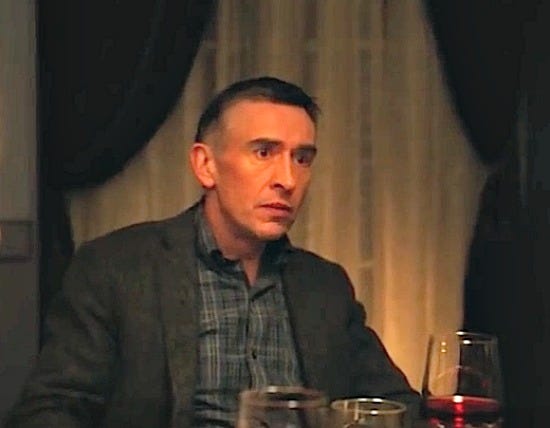The Dinner

Not since “My Dinner with Andre” has a meal seemed so full of portents and human collateral.
“The Dinner,” an intimate drama from writer/director Oren Moverman (“The Messenger”), gathers two brothers and their wives at one of those ridiculous “food art” restaurants for an encounter heavy with familial secrets and strife. Old grudges will be picked over, resentments stoked and then cooled, political ambitions balanced upon the edge of a knife, the future of young lives quarreled over.
Quite literally, by the time the check comes, the guests’ lives will be changed.
It’s a terrific ensemble cast: Richard Gere, Laura Linney, Rebecca Hall, Steve Coogan. There’s no true main character, though Coogan serves as the locus of events as Paul Lohman. He’s a former high school history teacher, a hyper-intelligent man who lives deeply inside his own mind, while struggling to relate to anyone on the outside.
Even as he’s interacting with other people — usually awkwardly — Coogan’s narration gives us a taste of the constant internal monologue spinning inside his brain, generally involving a mix of Civil War lore and a desperate nihilism about the fate of mankind.
Just about the only one who can reach him is his wife, Claire (Linney), a doctor who applies her great bedside manner to soothing her anxious, uppity mate. We watch her and admire the force of her presence, the beatific way she seems to calm everyone around her, the anchor amidst a sea of tumult.
Later, we’ll find reason to amend our opinion of her.
Gere is Stan Lohman, a Congressman who’s currently the favorite to win the governor’s chair. He’s got a major bill he’s sponsored on tap for a vote tomorrow, and his right-hand woman, Nina (Adepero Oduye), can’t fathom why he’s spending time on a family dinner at a critical juncture. Stan is a politician through-and-through, a clear line that runs through his personal and professional lives: a schmoozer, glad-hander and flimflam man.
But again: Down the line, we’ll come to reassess this character.
Rebecca Hall plays Kate, Paul’s self-described “trophy wife,” a much younger and beautiful woman who lends him an air of sophistication and grace. She’s the sort of person people tend to dismiss, and she uses that to bend her environment to her taste.
Chloë Sevigny pops up in flashbacks as Stan’s previous wife, though whether they parted through death or divorce, we know not.
Speaking of flashbacks: There are a lot of them. Based on the novel by Dutch writer Herman Koch, “The Dinner” jumps backward and forward in time with great vigor, to the point we sometimes aren’t sure if what we’re watching came before or after the previous scene. A few changes in hairstyles are our only clue.
But it’s the emotional thread that matters.
Suffice it to say, there was great darkness in the past, and more has arrived on their collective doorstep. I don’t want to say too much, other than it involves their trio of sons: Michael (Charlie Plummer), Paul and Claire’s kid; and Stan’s boys, Rick (Seamus Davey-Fitzpatrick), born to his previous wife, and Beau (Miles J. Harvey), an African-American boy they adopted.
As the dramaturgy unfolds, a parade of fetishized food dishes are presented to them by platoons of waiters, emceed by a host (Michael Chernus) who describes each plate with the overworked prose of a latter-day James Joyce.
(My God, people, it’s food: Stick it in your mouth and chew. When you’re hungry again, repeat.)
For a film that’s mostly people sitting and talking, “The Dinner” has an urgent energy about it. We sense that this seemingly ordinary evening will end up as the most important night of their lives. It’s a meal, and a movie, that sizzles.

